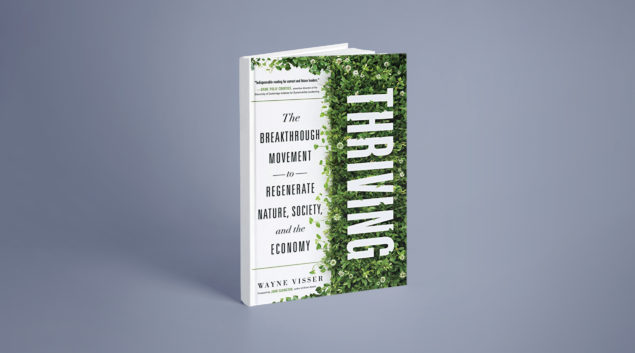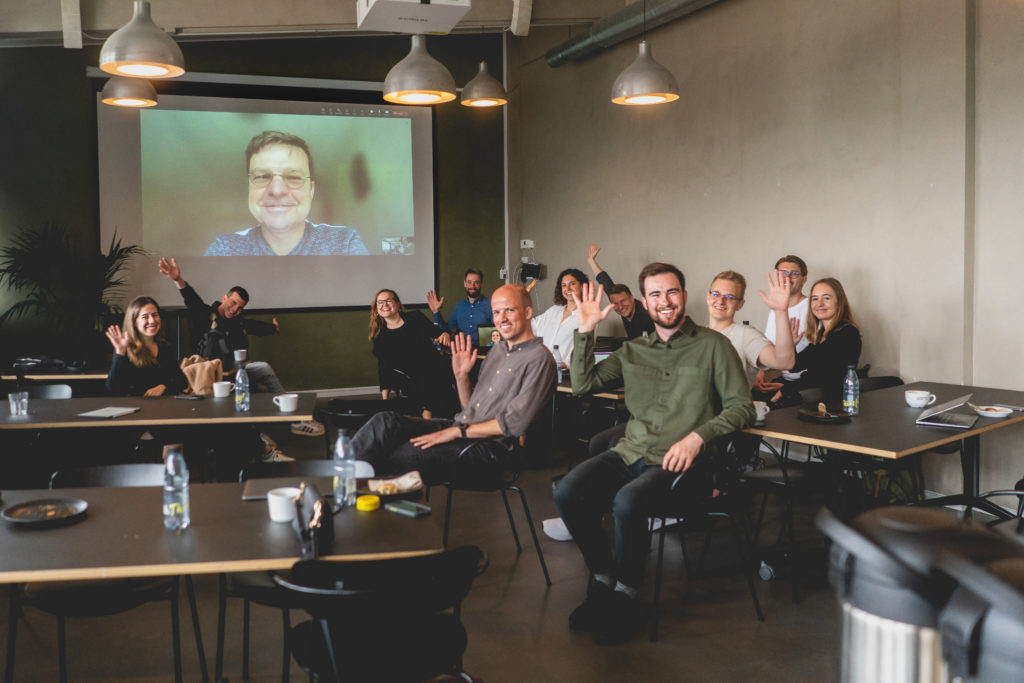
After some hectic spring months, we’re finally back with another post in our beloved book club series. And this time in a slightly different format, as Mr. Visser – the author of ‘Thriving’ – kindly agreed to join us for this month’s book discussion.
During the month of May, we read the newly released ‘Thriving: The Breakthrough Movement to Regenerate Nature, Society, and the Economy’ by Wayne Visser, a top thinker in sustainability and responsible business. In a nutshell, the book serves as an inspiring thought-piece and pragmatic guide on how to move forward as we strive for a better future for both people and the planet.
Thinking about the looming climate crisis can be overwhelming to say the least. But Wayne approaches the topic with contagious (yet level-headed) optimism, explaining how transformations come about, why they are necessary, and how we can leverage crises to bring about fundamental change. Whilst doing this, he touches upon a vast variety of topics including evolution, psychology, plant-based diets, and the triple-bottom-line, to name only a few. Wayne doesn’t only write to the minds but also to the hearts, ending each chapter ends with some of his captivating poetry.
As mentioned, we were lucky to have Wayne himself join us for our monthly book club get-together to exchange some thoughts on the central themes of his newest piece of work. Below you can find a few highlights from our discussion.
***
Q: The sustainability discussion is finally gaining momentum. Do you think that by introducing the concept of thriving and regeneration, one might scare off the people that have just managed to wrap their heads around sustainability?
Wayne: I believe it is good that we’re challenged. We’ve had around 35 years of sustainability, and are now in a position where the concept has become mainstream. We were dreaming of this day years ago. But as soon as something becomes mainstream, it means that it needs to be disrupted again. Why? Because people learn what is expected of them. The business leaders of today know that they’re expected to issue a yearly sustainability report, that they should have a Chief Sustainability Officer, and so on. But all of this doesn’t get us where we need to go – it just gets the critics and the regulators off their backs. What we’re seeing today is strategic sustainability. To make it transformative, we need to challenge the status quo, for example by engaging in discussions around new forms of capitalism. One critical aspect that also often is overlooked in other sustainability frameworks is resilience – one of the six keys to thriving that I present in the book. Unless you know how to survive and live through periods of disruption, you’re not going to be able to live sustainably, let alone thrive.
Q: As sustainability consultants, we believe that being bold in one’s messaging is important – however, clients can sometimes be intimidated by such an approach. With this in mind, how would you structure a compelling narrative?
Wayne: Companies today are still overly cautious and very risk-averse. I believe we have to keep collecting evidence and the stories of companies that have managed to successfully break through this barrier. Not all of them need to be the big usual suspects like Unilever and IKEA – there are also many innovative and inspiring start-ups to be found, for instance in the plant-based meat industry or in the circular textiles sector. Presenting specific and tangible cases of firms whose growth is fuelled by them tapping into an absolute need to solve social and environmental problems – that’s how you build a strong narrative. Another strategy is to engage people emotionally. Sometimes we over-intellectualize things and would be better off conveying bold messages through the arts, such as story-telling, poetry and film-making.
Q: What do you hope that sustainability professionals, or consultants such as ourselves, take from the book as our key insights?
Wayne: I believe it is important that we convince companies about the level of ambition needed to make the transition to a regenerative society. We must get business leaders to understand that a business-as-usual approach to sustainability simply won’t hack it, and that such an approach won’t even be in their best interest. Education – for instance about the dynamics of change and complex systems – will be important when preparing for the transformation we are already in. Alongside this, businesses also need to get ready to set bolder ambitions. We don’t have to let go of sustainability, but we have to challenge companies on whether their ambitions and actions are enough. Is it really enough to do a few community projects and promote gender diversity? Are we really striving towards thriving, or just doing the bare minimum? So the key takeaway is that a thriving mindset leads to different strategies and more ambitious actions, which are essential to creating the better future we all want.




